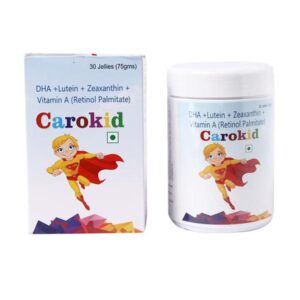DHA + VITAMIN A + LUTEIN
Dha: DHA (Docosahexaenoic Acid) is an omega-3 fatty acid that is commonly found in fish oil supplements. It is primarily taken as a dietary supplement in capsule or liquid form.
DHA is essential for brain development and function, and it plays a crucial role in supporting overall cognitive health. It is particularly beneficial for pregnant women, as it aids in fetal brain development. DHA is also used to support eye health and maintain good cardiovascular health.
The precise mechanism of action for DHA is not fully understood. However, it is believed to work by reducing inflammation in the body, promoting healthy blood flow, and protecting cell membranes.
The recommended dosage of DHA varies depending on the individual’s age, health condition, and reason for use. The typical adult dose ranges from 200 to 2,000 milligrams per day. Pregnant and breastfeeding women may require higher doses, as determined by their healthcare provider. It is important to consult with a healthcare professional before starting any supplementation.
DHA is generally well-tolerated, and side effects are rare. However, some individuals may experience mild gastrointestinal issues such as diarrhea, nausea, or belching. In rare cases, high doses of DHA may increase the risk of bleeding, so individuals taking blood-thinning medications or with bleeding disorders should exercise caution. It is always advisable to speak with a healthcare professional before starting any new supplement to ensure safety and suitability.
Vitamin A: Drug: Vitamin A
Use: Vitamin A is a fat-soluble vitamin that is essential for maintaining good health. It plays a crucial role in various bodily functions, including vision, immune system function, reproduction, and cellular communication.
Mechanism of Action: Vitamin A is involved in the formation and maintenance of healthy skin, hair, and mucous membranes. It is also required for the production of visual pigments in the retina, which are necessary for good eyesight. Additionally, Vitamin A supports the immune system by promoting the growth and development of immune cells. It acts as an antioxidant, helping to protect cells from damage caused by harmful molecules called free radicals.
Dose: The recommended daily intake of Vitamin A varies depending on age, gender, and specific health conditions. For adults, the recommended daily allowance (RDA) is around 900 micrograms (mcg) for men and 700 mcg for women. However, it is important to consult with a healthcare professional to determine the appropriate dosage for individual needs.
Side Effects: While Vitamin A is necessary for good health, excessive intake can lead to toxicity, known as hypervitaminosis A. Chronic excessive intake of Vitamin A can result in symptoms such as nausea, vomiting, headache, dizziness, blurred vision, and skin changes. Pregnant women should be cautious about consuming high amounts of Vitamin A, as excessive levels can be harmful to the developing fetus. It is always advisable to follow the recommended daily intake and consult with a healthcare professional before starting any vitamin supplement regimen.
Lutein: Lutein is a naturally occurring pigment known as a carotenoid. It is commonly found in fruits and vegetables, particularly in dark leafy greens such as spinach and kale. Lutein is also present in high quantities in the macula of the eye, which is responsible for central vision.
Lutein is primarily used as a dietary supplement to support eye health. It is believed to help filter harmful blue light and protect the macula from oxidative stress and damage caused by free radicals. This protection is important for maintaining healthy vision and reducing the risk of age-related macular degeneration (AMD) and cataracts.
The recommended daily dose of lutein varies depending on the specific eye health needs of an individual. However, typical doses range from 6 to 20 mg per day.
Lutein is generally considered safe with minimal side effects. The most common side effects reported include mild gastrointestinal disturbances such as nausea, vomiting, or diarrhea. In rare cases, some individuals may experience allergic reactions such as rash, itching, or swelling.
It is important to note that lutein supplements should not replace a balanced diet rich in fruits and vegetables. While lutein supplements can be beneficial for eye health, it is always recommended to consult with a healthcare professional before starting any new dietary supplement regimen, especially if you have any underlying medical conditions or are taking medications that may interact with lutein.

